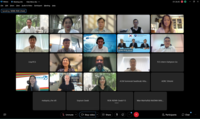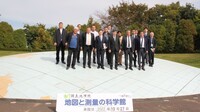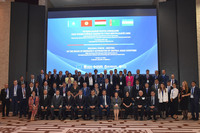ADRC organized a workshop entitled, "Differences in Disaster Risk Management (DRM) between Japan and other countries as seen by foreign residents in Japan: cooperation starts from understanding the differences" on 22 October 2022. The workshop, which was a side event at the BOSAI KOKUTAI 2022, covered a range of issues, including: engagement of foreign residents in disaster prevention activities; risk communication; and ways to bridge the differences in DRM practices among Asian countries.
In the first presentation, Dr. Khaerunnisa (Head, Master of Architecture Program, University of Atma Jaya Yogyakarta, Indonesia), a former foreign student in Osaka, pointed that Indonesia and Japan have relatively different types of support networks for students in times of disaster. In Japan, foreign students can organize themselves to establish a network of support system. This network of students is often country-based and informal. So, students' access to disaster information and engagement in drills conducted by the Japanese local governments are limited. However, disaster information from mass media, TV, internet, and radio are readily accessible to foreign students. By contrast, in Indonesia, it is the government agency that facilitates the organization of community networks (including student networks) to build a strong support-system in times of disasters.
Mr. NAGANO Koichi (Director, Policy Planning and Coordination Department, Hyogo International Association) provided the second presentation highlighting HIA's activities to support foreign residents during disasters. Among the activities he mentioned, are: 1) "multilingual pointing board", an initiative that shows guidance for preparation and evacuation in times of disaster; 2) "Disaster Preparedness Guide for Children and Parents", a publication disseminated to all residents; and 3) "My Evacuation Card", a card that provides simple instructions for evacuation in nine different languages. Mr. Nagano acknowledged that HIA faces a number of challenges in implementing these activities, such as how to effectively communicate disaster forecasts and warnings to foreigners through SNS and internet with multilingual support.
Mr. MAMIYA Keita (Risk Management Section Officer, Policy Department, Kusatsu City, Shiga
Prefecture) shared Kusatsu City's pioneering program of organizing "Foreign Firefighters". In this program, the city designates foreign residents who are fluent in both native and Japanese languages (as well as having deep understanding of Japanese lifestyle and culture) to be firefighters. During normal times, foreign firefighters receive training and participate in disaster risk reduction activities, including seminars and lectures. During emergency, foreign firefighters also help in disseminating information via SNS, support safe evacuation, and assist in counselling using their respective native languages.
Dr. Gerry Potutan (Senior Researcher, ADRC) presented the outcomes of the online survey that looked into the differences in DRM practices between Japan and other countries as perceived by foreign residents. Results showed that foreign residents generally perceived Japan's DRM practices (e.g., hazard maps, disaster drill, evacuation guidance, and early warning) to be "excellent" compared to their respective countries of origin. By rating "excellent", respondents indicated that Japan serves as benchmark to other countries in terms of planning and designing effective DRM programs. In terms of the key challenge in risk communication, most respondents mentioned "language barrier". To address this challenge, respondents suggested the following: use of visual tools (e.g., images, drawings, and signs); reach out to foreign residents early (e.g., during arrival and registration process) for disaster preparedness; and enhance multilingual services (e.g., translations and subtitles in more languages).
At the closing, MR. ARAKIDA Masaru (Director, Researcher Department, ADRC), who moderated the workshop, acknowledged that since foreign residents in Japan came from diverse culture and background, it is expected that the DRM practices of their respective countries can be different from Japan. This situation can be challenging for most Japanese local governments to communicate disaster risk. The suggestions that came up in this workshop will offer insights on how to address this challenge. He also mentioned that all presentation materials can be accessed on ADRC website:





